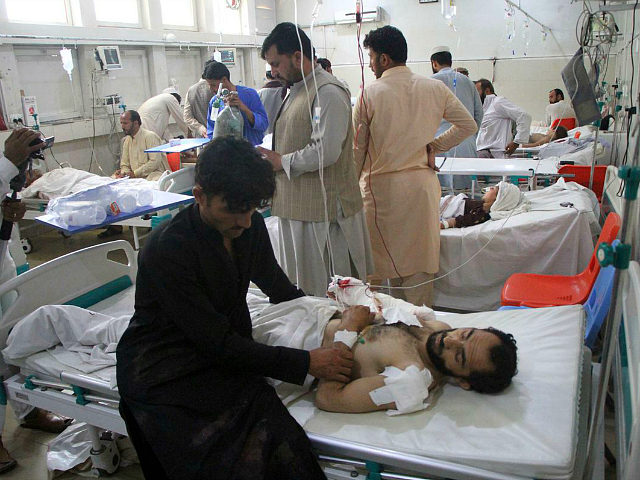Taliban narco-jihadis claimed responsibility for an attack in the Afghan capital of Kabul that killed at least 14 and maimed nearly 150 others Wednesday.
The attack came after Zalmay Khalilzad, the top U.S. peace envoy, hailed “excellent progress” following the latest round of negotiations with the Taliban in Qatar over the weekend.
Negotiations continued beyond the weekend into the day of the attack on Wednesday, the New York Times (NYT) reported, adding:
Late into the evening on Wednesday, American diplomats and Taliban officials continued their negotiations behind closed doors at a marbled-floor venue. Taliban officials took a prayer break. They checked their phones — including for the latest details of the attack — as they walked back to the hall. The setting, under a calm pink sunset that descended on palm trees around the venue, was far from the heartbreak in Kabul.
Nasrat Rahimi, a spokesman for the Afghan Interior Ministry, revealed that the Taliban bomber detonated the explosive at a checkpoint outside a police station.
For nearly a year, the U.S. and the Taliban have been discussing a potential peace pact.
The agreement revolves around the withdrawal of foreign forces in exchange for assurances that international terrorist groups like al-Qaeda and the Islamic State (ISIS/ISIL) will no longer operate in Afghanistan. The U.S. hopes to have an agreement this year. U.S. negotiators are also pushing for a much-needed ceasefire, and intra-Afghan talks since the Taliban continues to refuse to negotiate with Afghan President Ashraf Ghani’s administration. Nevertheless, Taliban jihadis have intensified their attacks amid the peace talks that began nearly a year ago, carrying out attacks on an almost everyday basis.
On Wednesday, Sediq Sediqqi, a spokesman for President Ghani, told reporters: “Continued Taliban attacks indicate that they have no commitment to peace, unfortunately. Any Taliban attack will impede the peace process.”
It appears the Taliban has capitalized on the peace talks to escalate their terrorist activities, “deliberately targeting civilians,” the U.N. found.
“In the last month alone about 1,500 people have been killed or injured. … The Taliban also called for a boycott of the country’s 28 September presidential election, and threatened to attack election rallies,” BBC reported, adding:
A huge bomb outside a police station in the Afghan capital Kabul has killed at least 14 people and injured nearly 150. The explosion sent a large plume of black smoke into the sky and left nearby buildings in ruins. Most of those wounded were civilians.
The Taliban say they carried out the attack. … The Taliban also claimed they had targeted a “recruitment” center and had killed a large number of police and soldiers.
Taliban terrorists control or contest about half of Afghanistan, more than during any other time since U.S. troops removed the group from office in October 2001.
The cultivation and production of opium and its heroin derivative has also reached historic levels, generating millions for the Taliban even during peace talks. Pentagon officials have deemed opium and heroin the Taliban’s top source of income. The drugs are fueling the historic number of drug overdoses in the United States to a minuscule degree, the Drug Enforcement Agency (DEA) argues.
On Tuesday, suspected Taliban terrorists reportedly bombed a van carrying employees from the Interior Ministry’s counternarcotics division, killing five and wounding seven.
Despite more than $8 billion in U.S. funding devoted to counternarcotics in Afghanistan, the country remains the world’s top supplier of heroin and opium.
The Taliban appear to consider America’s willingness to engage in peace talks as a victory for them. The group dubbed its annual spring offensive this year “victory.” On the other hand, the United States has defined victory in Afghanistan as the “political reconciliation” between the Taliban and Kabul.
U.S. President Donald Trump’s administration has made reconciliation the primary goal of its strategy to end the war.

COMMENTS
Please let us know if you're having issues with commenting.